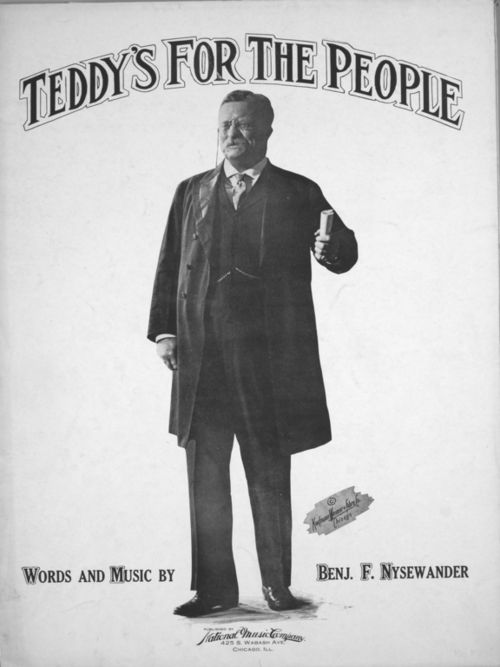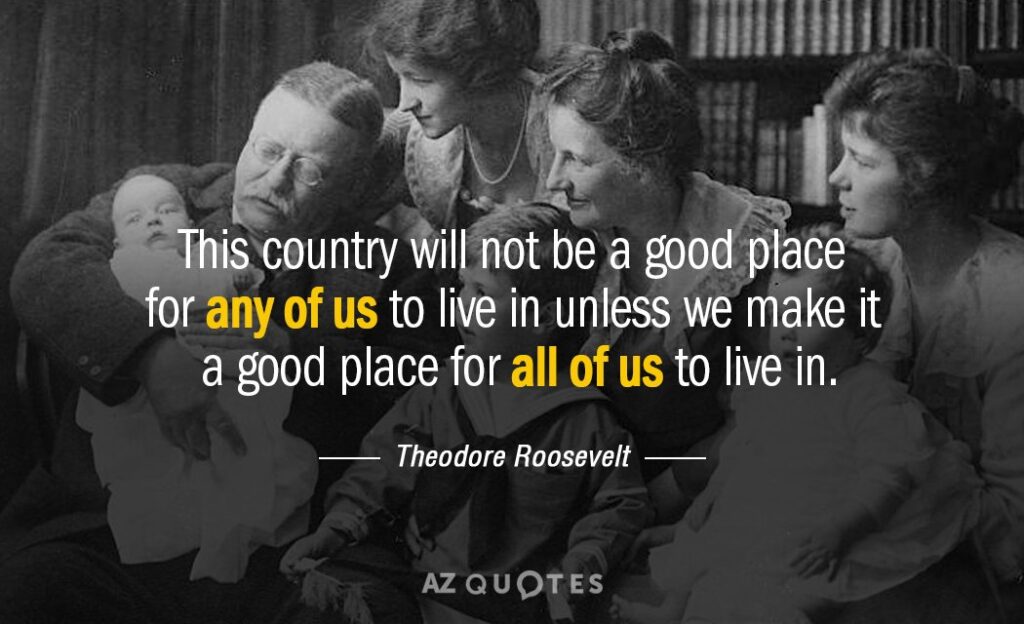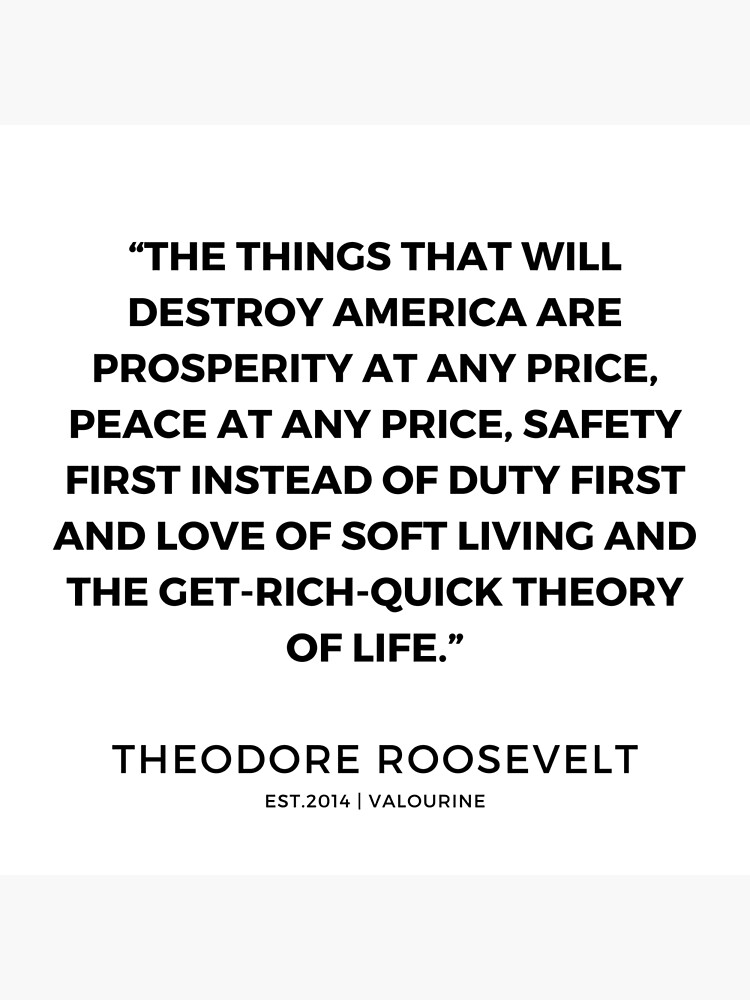Score
Harris +4 Trump +2
Theodore Roosevelt campaigned against privilege primarily because he saw its corrosive effects on the average American family. A devoted family man himself, TR worked to prevent child labor and improve working conditions so that workers could fully contribute to their families and to the nation as a whole. He was realistic about the changes necessary to give those families a “square deal”, saying that
But when I say, I am for the square deal, I mean not merely that I stand for fair play under the present rules of the game, but that I stand for having those rules changed so as to work for a more substantial equality of opportunity and of reward for equally good service.
Today’s American workers face similar obstacles to building strong families and contributing to society. Redistribution of wealth through taxation will not solve these problems. Only changing the laws and the rules of today’s game will build the strong families and strong America necessary to meet the challenges of the future.
Immigration
The sudden arrival of over 20,000 Haitian immigrants in the city of Springfield, Ohio, has become a microcosm of the nationwide impact on American citizens of the Biden-Harris open immigration policy. The issue was never about the damn cats. It was about importing and dropping a huge community of foreign nationals on a city already struggling with unemployment and decline (see this post from X). A local plant then justified on the grounds that the Haitians were better employees. Meanwhile, rents continued to climb and the local school district had to try to integrate a large influx of students, many of which did not speak English.
American workers were just beginning to catch up to living costs when this hurricane of immigrants hit them. Even the Federal Reserve Chairman recognizes that this wave of over 8 million immigrants has increased the unemployment rate. Meanwhile, the Biden Administration also allows the tech industry to use the H1B program to undercut wages of STEM workers despite the fact that the STEM unemployment rate is higher than the national average.
This mass importation of foreign immigrants represents a new slavery this administration celebrates rather than fights (see this past post). Vice President Harris has taken even more extreme positions in favor of it. Her failures and those of President Biden rate a minus 2.5 score. Unfortunately, President Trump has moved more toward the corporate globalist approach. He calls for the unrealistic goal of “mass deportation”, closing the border and E-verify while also supporting automatic green cards for foreign students. He thus earns only a plus 1 score on the issue.
Antitrust and Consumer Protection
This is an issue where the Biden – Harris administration has really shined. They reinvigorated antitrust enforcement by fully utilizing the Clayton Act to object to mergers and bringing suit against tech companies like Google and Facebook for using their market power for monopolization. The Federal Trade Commission under its Chair Lina Khan has also led on antitrust and in expanding basic consumer protections. In particular, the ban on the abuse of non-compete clauses will free many workers to fully utilize their skills where they can be better compensated (though I worry the ban exceeds the Commission’s jurisdiction).
Unfortunately, in the rush to raise campaign funds from Silicon Valley, Vice President Harris refuses to say whether she would reappoint Khan to the Commission. Nevertheless, she has expressed support for the antitrust campaign and earns a plus 2.5 as a result. While Trump initiated the Google case during his term, he has changed his position and parroted the corporate line against these efforts. It is possible that RFKJr will be able to turn him back to a more active antitrust role, but for now, he rates a minus 1.
Child Tax Credit
American families have historically struggled to raise their children with little help from federal and state governments. During the COVID pandemic, the Biden Administration’s COVID stimulus plan expanded the child tax credit to as much as $3,600 a year and included low income families who were previously ineligible for the credit because they were not paying taxes (see this past post). This halved the child poverty rate, which then rose when the program ended in 2022.
Both Harris and Trump support expanding the credit. Harris proposes a $6,000 annual credit while Trump’s running mate Sen. J.D. Vance has filed legislation to expand it to $5,000 per year. As this article relates, the most likely difference between the two plans is that Harris may limit the credit to low-income families, which would reduce the impact on the federal deficit. Both campaigns deserve credit for supporting families by expanding the credit, with Harris earning a 2.5 score and Trump a score of 2.
Housing
Home is where the heart of a family resides, but more and more families are unable to realize that dream because of lack of affordable housing. There are many causes – high building costs, local zoning regulations, private equity purchases of local housing for investment and high mortgage rates, among others. It is a national crisis that needs a comprehensive response.
Vice President Harris has proposed a plan that would give first time home buyers a $25,000 tax credit, create incentives for home builders and control the purchases of single-family homes for investment. She also said she would challenge regulations that limit the construction of homes. Here in the West, we are unfortunately familiar with the environmental restrictions on logging that have significantly reduced lumber supply. Color me skeptical that Harris will actually break with environmental groups on these restrictions. However, the plan is a good start and merits at least a 1.5 rating.
Trump’s plan is less comprehensive and relies on lowering corporate tax rates, cutting federal regulations and reducing demand by deporting immigrants. It is not clear how much this would impact the problem and so it only rates a zero score.
Conclusion
While both candidates score positively on achieving a square deal for America’s families, the differences in method matter. Vice President Harris appears to believe she can ameliorate the socioeconomic crisis of open immigration with federal regulations and dollars. Her proposals would help but would be more effective and cheaper if immigration was controlled. Trump understands that immigration is an underlying cause of many of American worker’s problems. However, except for the child tax credit, he opposes further federal help to solve them. A nationalist like TR would recognize we need progress on both fronts if we are to truly reduce wealth inequality and give American families the hope, stability and square deal they deserve.



